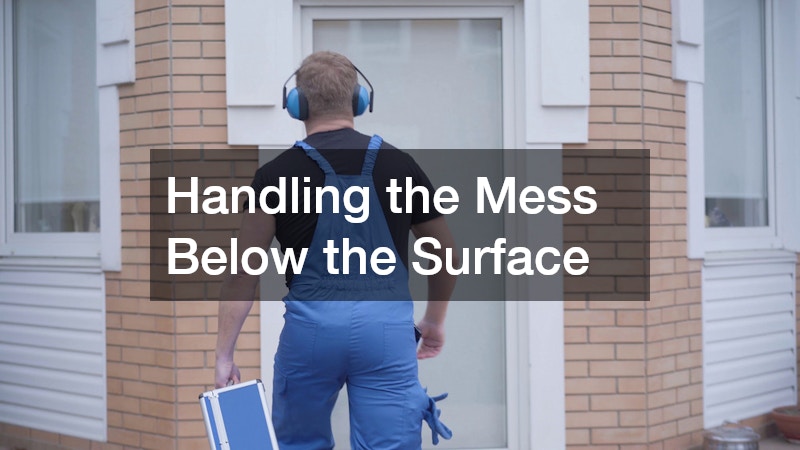
Homeownership is often described as the American dream, but that dream sometimes comes with a leaky faucet, a broken AC unit, or a roof that’s seen better days. Whether you’re a first-time homeowner or a seasoned property investor, maintaining a house requires time, effort, patience, dedication, and a little bit of know-how—especially when it comes to hiring the right professionals.
The average home contains a range of interconnected systems: electrical, plumbing, HVAC, roofing, and more. When one of these systems breaks down, it can quickly escalate from a minor inconvenience to a costly issue. But here’s the good news: you don’t have to be an expert in everything. You just need to know whom to call.
That’s where the main contractor comes in.
Acting as the project manager of the repair world, a qualified professional oversees and coordinates everything from diagnostics to repair completion. They manage the schedule, hire specialized tradespeople when needed, and ensure the work meets safety standards and local codes. In cases where repairs involve multiple areas—like a water leak that affects flooring, drywall, and electrical systems—this expert can be your single point of contact, streamlining the process and reducing stress.
Of course, not every issue requires a full-service repair team. Some problems are best handled by specialists, such as certified HVAC technicians or licensed plumbers. Understanding when to call a general contractor versus a niche expert is essential to avoid unnecessary costs and delays.
This guide walks you through ten common types of home repairs—from a broken air conditioner to foundation issues—and explains not only what’s likely causing the problem, but also which type of contractor you need to call. Whether it’s a minor fix or a major overhaul, you’ll know who to trust to get the job done right.
Let’s dive into the essential fixes every homeowner should be prepared for—and find out when it’s best to call in a professional who can coordinate the job.
Keep Cool With the Right Help

When summer temperatures soar, your air conditioning unit becomes more than a convenience—it’s an absolute necessity. A malfunctioning AC can quickly make your home uncomfortable, especially during a long heatwave. Common signs that your AC needs repair include warm air blowing from vents, weak airflow, water leaks near the unit, or strange, unusual noises. The cause of these issues can vary, from clogged filters and refrigerant leaks to faulty wiring or a broken compressor. While a certified HVAC technician can typically handle isolated ac repairs, homeowners often overlook hidden damage or outdated systems. If your home’s cooling issues are linked to poor ductwork design, insulation problems, or electrical panel limitations, a qualified professional may need to get involved.
This expert can coordinate the required electrical and structural adjustments, while also ensuring any upgrades comply with local building codes. They’ll help assess whether your system needs repair, replacement, or redesign—and they’ll bring in the right specialists to do the job right.
When Comfort Systems Go Down, Call a Pro
Unlike standalone air conditioning repairs, HVAC repairs affect your home year-round. A faulty HVAC system can lead to uneven temperatures, poor indoor air quality, or even complete system failure. These problems often result from malfunctioning thermostats, dirty coils, broken blowers, or damaged ductwork.
In many cases, HVAC repairs are handled by licensed HVAC contractors. However, when your system is part of a larger home renovation or repair project—like installing energy-efficient upgrades or reconfiguring airflow—you may need a main contractor to oversee the project.
This is especially true when HVAC issues overlap with structural concerns, like poor attic ventilation, inadequate space in utility rooms, or outdated insulation. The main contractor can ensure that the HVAC technician’s work complements other home systems and doesn’t compromise the building’s overall integrity or safety. It’s all about coordination, especially when the comfort of your entire home is at stake.
Fixing the First Line of Defense Overhead
Your roof protects your home from the elements, making it one of the most crucial components of your property. Damage can occur gradually over time from weather exposure, or suddenly during a storm. Missing shingles, leaks, sagging areas, and clogged gutters are all signs that roof repair is needed.
While roofing contractors are the go-to professionals for repairing or replacing roofing materials, the scope of work may extend beyond surface fixes. For instance, a persistent leak might have caused water damage to the ceiling, insulation, or even your electrical wiring.
In such scenarios, a main contractor provides a holistic view of the damage. They’ll assess the extent of interior and structural issues, and coordinate roofers, drywall installers, and electricians to restore your home safely and efficiently. By managing multiple trades under one roof—literally—the main contractor ensures seamless repair from top to bottom.
What to Do When the Ground Beneath You Shifts

Foundation problems can spell big trouble. Cracks in walls, sloping floors, sticking doors, or gaps between walls and ceilings are all warning signs. Causes range from poor soil conditions and water damage to seismic activity or age-related settling.
Foundation repairs are complex, often involving excavation, slab lifting, or pier installation. Because this type of work affects the structural integrity of your home, it requires more than just a specialty contractor. Enter the main contractor.
With their experience in managing large-scale projects, a main contractor can coordinate structural engineers, foundation specialists, and city inspectors. They’ll ensure that the repair is not only technically sound but also compliant with zoning laws and safety regulations. This is not the time for DIY—you need someone who can manage the big picture.
Restoring Your Home’s Water Supply Fast
If your home relies on a well for water, a broken pump can bring everything to a halt—showers, washing dishes, flushing toilets, and even irrigation systems. Signs of a failing well pump repair include sputtering faucets, low water pressure, or no water at all, which can disrupt daily life and hygiene.
A certified well technician can typically diagnose and repair the pump. However, if the issue extends to electrical wiring, pressure tanks, or underground piping, a main contractor may be necessary to oversee the repair process, especially when multiple systems are affected.
Especially in older homes or rural areas, a main contractor can evaluate whether the issue stems from outdated infrastructure or environmental factors such as soil erosion or seasonal changes. Their ability to coordinate plumbing, electrical, and excavation work makes them invaluable in complex situations, ensuring a thorough and long-lasting solution.
Breathe Easier With the Right Repair Specialist
Air ducts are the hidden highways of your HVAC system, responsible for delivering conditioned air throughout your home. When ducts become clogged, leaky, or disconnected, it leads to uneven temperatures, higher energy bills, and poor air quality, which can aggravate allergies and respiratory issues.
While HVAC technicians can clean and seal ducts, issues like mold, pest infestations, or collapsed ductwork may require more extensive intervention. In such cases, a main contractor can assess whether insulation, flooring, or ceiling work is needed as part of the air duct repair to fully restore your home’s environment.
They’ll also coordinate with air quality experts and HVAC professionals to ensure the solution addresses both comfort and health concerns. When it comes to breathing clean air, cutting corners just isn’t worth it—proper repairs protect your family’s well-being and improve overall home efficiency.
Swift Action for Unexpected Water Trouble

Water damage can be devastating. Whether it’s caused by a burst pipe, a leaking roof, or a natural flood, moisture can wreak havoc on walls, flooring, wiring, and insulation. Immediate action is crucial to prevent mold growth and structural deterioration, which can pose serious health risks if left untreated.
Local water damage repair companies can handle initial cleanup, drying, and sanitization. However, if the damage is extensive, a main contractor becomes essential. They’ll coordinate the rebuilding of affected areas, including drywall, flooring, cabinetry, and even electrical rewiring, ensuring all repairs meet local building codes and safety standards.
A professional ensures that the job isn’t just about drying out—it’s about fully restoring your home’s safety and functionality. They also work closely with insurance adjusters and inspectors to document damage and validate repair costs, saving you time and hassle while helping you navigate the claims process smoothly.
When Flushing Fails, Here’s Who to Call
A broken toilet might seem like a minor inconvenience, but recurring clogs, constant running, or leaks can waste water and cause unseen damage to flooring and subflooring. Left unchecked, these issues can lead to mold growth and costly structural toilet repair. Most toilet issues can be resolved by a plumber, but persistent problems may indicate deeper issues within your home’s plumbing system.
If your toilet issues are linked to outdated pipes, improper installation, or slab leaks, you may need a professional to oversee more extensive plumbing work. They’ll bring in certified plumbers and also ensure the surrounding structure—flooring, cabinetry, and drywall—is repaired or protected to prevent further damage.
In multi-bathroom homes or during full bathroom remodels, having a qualified project manager coordinate the timeline and trades ensures the job is done right, with minimal disruption to your daily life and a seamless finish that meets both safety and aesthetic standards.
Don’t Let Kitchen Essentials Break Your Routine
Your refrigerator is one of the most used appliances in your home, and when it stops working, it can disrupt your entire routine. Common issues include inconsistent cooling, water leaks, loud noises, or complete power failure. Delays in refrigerator repair can lead to spoiled food and costly replacements.
Usually, a refrigerator repair falls under the expertise of an appliance technician. However, if the failure is linked to electrical panel problems, flooring damage from leaks, or cabinetry modifications for replacements, you might need a professional who can coordinate all aspects of the repair.
They’ll ensure the appliance is not only repaired or replaced but also that your kitchen remains safe and functional in the process. For high-end kitchen remodels or smart appliance integrations, a qualified expert coordinates with electricians, plumbers, and cabinetry specialists to deliver a smooth and efficient outcome.
Handling the Mess Below the Surface

Few problems are more unpleasant—or more urgent—than a sewer back up repair. These issues pose serious health risks and often lead to significant property damage. Common causes include tree root intrusion, clogged pipes, or broken sewer lines.
While a licensed plumber can address many sewer line issues, backups that affect flooring, drywall, or foundation integrity require coordination across multiple trades. Here, a main contractor’s oversight is invaluable.
They’ll organize plumbing repairs, structural reinforcements, and cleanup efforts while liaising with municipal authorities and insurance companies. Their expertise helps restore your home safely and quickly, reducing the risk of prolonged exposure to hazardous conditions.
Owning a home means taking on the responsibility of maintaining its many systems—and knowing when to call in help. Whether you’re dealing with something as common as a broken AC or as serious as foundation damage, the right professional makes all the difference.
For straightforward problems like appliance glitches or clogged toilets, calling a specialist often gets the job done. But for more complex, multi-layered repairs—especially those involving structural elements, multiple trades, or full-system coordination—having an experienced project manager is your best option.
This professional isn’t just someone who hires workers. They’re a project manager, quality controller, and advocate rolled into one. They ensure that every part of your home works in harmony—from electrical and plumbing to HVAC and structural integrity. They manage scheduling, permits, compliance, and unexpected issues, saving you time, money, and countless headaches.
If you’re facing a repair that affects multiple areas of your home or requires input from several professionals, don’t try to juggle it alone. Bringing in an expert who can streamline communication, bring experience to the table, and take ownership of the project from start to finish can prevent small issues from turning into major setbacks.
Remember, the goal isn’t just to fix your home—it’s to maintain its value, safety, and comfort for years to come. And that starts with calling the right expert at the right time.
